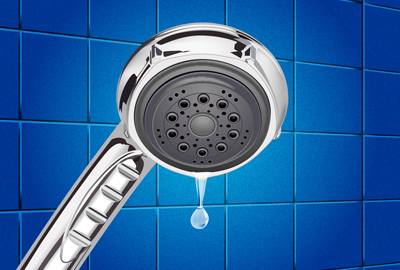
The bathroom is a practical place to start in the "greening" of your home. The bathroom is where much water is used and often wasted, and everyone spends a lot of cumulative time in the "loo." Here are some home improvement tips for making your bathroom greener.
1. Install low-flow aerators on your faucets. You can also get low-flow aerators for your show er head. These aerators do just what their name implies – they add air to the water. They help to spread the water over a larger area so less water is needed to shower, brush your teeth, wash your hands, and so forth. Low-flow aerators restrict the overall flow of water but increase the force and pressure, making a small amount of water very effective.
2. Paint your bathroom green, even if it's pink or blue or white. Invest in green (eco-friendly) paint to give your bathroom a fresh, new look without spending a lot of money. Paint that is truly "green" is low in volatile organic compounds (VOCs). Ideally, the paint you choose will be completely free of VOCs. Many green paints also feature natural pigments derived from vegetable sources. Bathrooms are usually small spaces, and you especially want to keep harmful vapors at a minimum.
3. Upgrade your toilet. If you have an older model, it probably uses around 3-5 gallons of water per flush. More modern toilets use a little over one and a half gallons per flush. For older models, you can easily convert your toilet to a low-flow one by placing a weight in the toilet's tank.
Go raid your recycling bin and find a water- and rust-proof container such as a half-gallon plastic milk jug, glass milk bottle, or plastic 2-liter bottle. Put gravel or sand into the container, cap it, and place the weighted container into your toilet tank. Make sure the flapper, float, flush arm, and other components of the toilet "guts" are not touching the weight. This displaces some of the water, meaning your toilet tank fills up using less water and consequently uses less water per flush.
You can also install a dual-flush system in your existing toilet. This gives bathroom visitors a choice between a little water or a bit more water depending on the nature of the waste. You can get a dual-flush kit for around $30 and install it yourself.
There are also specially-made low-flush toilets if you simply want to replace the one you have.
4. Your rubber or plastic shower curtain can be replaced with one made with more natural materials. More attention is being paid to the toxic vapors that emanate from soft plastics, and shower curtains are no exception. Use linen or cotton, or even make your own.
5. Consider a tankless water system. This saves a great deal of water, since you don't have to run the water, waiting for it to get hot, before getting in the shower. And the hot water will never run out, since it is not being kept in a reservoir (tank). This also saves electricity, since you don't have a tank of water sitting in your basement that needs to be kept hot constantly regardless of usage.

